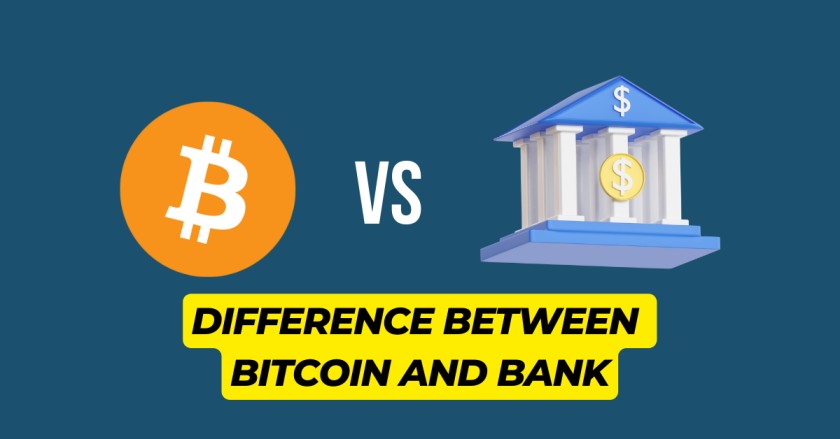Bitcoin has been a buzzword in the financial world for quite some time now. Many people see it as an alternative to traditional banking and an investment opportunity that could potentially make them rich. But what is bitcoin, and how is it different from banks?
In this article, we’ll take a closer look at the difference between Bitcoin and Bank.
How Bitcoin Work?
Bitcoin is a decentralized digital currency that operates on a peer-to-peer network without the need for a central authority or intermediary. The Bitcoin network relies on cryptographic protocols to ensure the security and integrity of transactions.
At the core of the Bitcoin network is the blockchain, a decentralized public ledger that records all transactions in the network. When a user initiates a transaction, it is broadcast to the entire network of users, who validate the transaction using complex algorithms and cryptographic keys. Once the transaction is validated, it is added to the blockchain and becomes a permanent part of the network’s history.
To participate in the Bitcoin network, users need a digital wallet that contains their private and public keys. The private key is a secret code that allows the user to access and spend their Bitcoin, while the public key is used to receive Bitcoin from other users.
Bitcoin mining is the process by which new Bitcoin are created and transactions are verified. Miners use powerful computers to solve complex mathematical problems that confirm transactions and add them to the blockchain. In exchange for their work, miners receive newly minted Bitcoin and transaction fees.
Bitcoin transactions are irreversible and anonymous, making it a popular choice for individuals and businesses who value privacy and security. However, this anonymity has also made it attractive to criminals for use in illegal activities such as money laundering and ransomware attacks.
How Banks Work?
Banks are financial institutions that offer a variety of services to individuals and businesses. Their primary function is to take deposits from customers and use those funds to make loans and investments.
When a customer opens an account with a bank, they deposit their money into that account. Banks are required to keep a portion of these deposits on reserve, which means they cannot lend out all of the money they receive. The reserve requirement is set by the central bank of a country, such as the Federal Reserve in the United States.
Banks make money by charging interest on loans they provide to customers. The interest rate on a loan is based on the risk associated with the borrower and the duration of the loan. Banks also charge fees for various services such as account maintenance, ATM withdrawals, and wire transfers.
Banks use a variety of techniques to manage risk associated with lending, including underwriting standards and credit analysis. Banks also diversify their loan portfolios across different industries and geographies to reduce their exposure to risk.
In addition to providing loans, banks also offer other financial services such as checking and savings accounts, credit cards, investment services, and insurance products. Banks earn fees and commissions from these services as well.
Central banks play a key role in the banking system, regulating the money supply and ensuring the stability of the financial system. They also provide services to banks such as clearing and settlement of transactions and acting as a lender of last resort in times of financial crisis.
How Bitcoin Ensures Security:
Bitcoin ensures security through the use of cryptography and decentralization. Transactions are verified by a network of users, rather than a central authority, making it difficult for hackers to manipulate the system. The blockchain, a public ledger, also provides transparency and prevents double-spending.
How Banks Ensure Security:
Banks ensure security through physical measures like secure facilities and trained personnel. They also have strict authentication protocols, such as passwords and two-factor authentication, to protect customer data. Compliance with regulations, like anti-money laundering laws, is also critical for maintaining security.
How Bitcoin Is Decentralized:
Bitcoin is decentralized through the use of a peer-to-peer network of users who validate transactions and maintain the blockchain. This removes the need for a central authority, like a bank, to oversee transactions. The decentralized nature of Bitcoin also provides increased security and transparency, as no single entity has control over the system.
How Banks Are Centralized:
Banks are centralized institutions, meaning that they have a single central authority that oversees transactions and makes decisions. Transactions are processed and stored on the bank’s own systems, rather than a public ledger. This centralization allows for greater control and regulation, but can also make the system more vulnerable to attacks or data breaches.
How Bitcoin Provides Anonymity:
Bitcoin provides anonymity through the use of pseudonyms and public addresses, which are not linked to a user’s personal information. This allows users to conduct transactions without revealing their identity. However, the transparency of the blockchain means that transactions can still be traced, making complete anonymity difficult to achieve.
How Banks Do Not Provide Anonymity:
Banks require identification and personal information from account holders, making anonymity difficult to achieve. This is to comply with regulations like anti-money laundering laws and to prevent fraudulent activity. Banks also have access to customer data, which can be vulnerable to hacks or data breaches.
How Bitcoin Fees Work:
Bitcoin fees are paid by the sender of a transaction and are used to incentivize network users to confirm the transaction. The higher the fee, the quicker the transaction will be processed. However, high network demand can lead to higher fees. Users can also choose to set their own fees based on network demand and transaction priority.
How Bank Fees Work:
Banks typically charge fees for various services, such as ATM withdrawals, wire transfers, account maintenance, and overdrafts. These fees vary depending on the bank and the type of account or service being used. Banks may also charge interest on loans or credit card balances. Fees can add up quickly, especially for those who frequently use bank services.
How Bitcoin Transactions Work:
Bitcoin transactions involve the transfer of funds from one digital wallet to another. Transactions are verified by network nodes through cryptography and recorded in a public ledger called the blockchain. Transactions can be processed quickly, usually within minutes, and are irreversible once confirmed.
How Bank Transactions Work:
Bank transactions involve the transfer of funds between two or more bank accounts. Transactions are processed through the bank’s internal systems and can take varying amounts of time to clear depending on the type of transaction and the banks involved. Transactions can be reversed or canceled under certain circumstances.
How Bitcoin Are Available:
Bitcoin and traditional banks differ in various ways. Bitcoin is accessible 24/7 from anywhere in the world with an internet connection, requiring only a digital wallet and device to access the blockchain network.
However, Bitcoin is less fungible than other currencies, requiring users to find merchants willing to accept it, although the number of such merchants is increasing. Bitcoin is an asset that involves only one transfer, allowing for direct transfer to merchants, which simplifies the transaction process.
How Banks Are Available:
In contrast, traditional banks usually operate during set business hours and may not be open on weekends or holidays. Although customers can access their accounts through online banking or mobile apps outside of business hours, certain services may not be available.
Bank accounts are primarily used for storing money, and spending the funds requires a third-party transaction to retrieve the money from the account, such as using an ATM or debit card. Banks hold fiat currency on behalf of their customers, allowing the money in a bank account to be universally used within the economy of the country where it is held. For example, a dollar held in a US bank account can be used for any transaction within the United States.
How Bitcoin Are Regulated:
Bitcoin is decentralized and operates without a central authority or regulatory body. However, some countries have implemented regulations and laws related to the use and exchange of cryptocurrencies.
How Banks Are Regulated:
Banks are regulated by government agencies such as the Federal Reserve, FDIC, and OCC. These agencies oversee banking practices to ensure safety and soundness in the financial system. Banks must follow regulations related to capital requirements, lending practices, and consumer protection.
Bitcoin Stability
Bitcoin is a highly volatile and unstable asset, with its value prone to significant fluctuations over short periods. Its value is primarily determined by market demand, as the supply of Bitcoin is fixed. With no central regulating authority, the price of a Bitcoin is almost entirely driven by supply and demand in the market.
While this means that governments cannot erode the value of Bitcoin through inflationary policies, it also means that the value of Bitcoin is subject to severe swings. As the demand for Bitcoin increases, its value can rise sharply, but if the demand declines, the value of Bitcoin can also drop significantly.
Banks Stability
Banks are generally regarded as more stable and reliable compared to Bitcoin, with greater security and stability. Banks are heavily regulated by the government and operate under strict rules and regulations, providing an added layer of security. The funds held in a bank account are typically insured by government-backed schemes, which further enhances the stability and security of banks.
Money held in a bank account can also earn interest at a fixed rate, which is determined by a contract between the consumer and the bank. However, the value of the currency itself can change due to factors such as inflation, causing the value of each dollar in the account to erode over time. Although banks typically offer an interest rate to offset this erosion, it is rare for the interest rate to keep up with actual inflation.
Banks provide greater stability and security in terms of the value of money held in a bank account, but the erosion of value due to inflation remains a concern.
- Fractional Reserve Banking: How it Works and its Impact on the Economy (March 13, 2023)
- Bitcoin and Criminality: Separating Myth from Reality (March 12, 2023)
- Bitcoin as a Store of Value (March 12, 2023)
- What is Web3? (March 12, 2023)
- What is Hash Rate? (March 12, 2023)
- Understanding PMLA Provision for Crypto Asset Regulations (March 10, 2023)
- Distributed Ledger (March 9, 2023)
- Why Stablecoin and Bitcoin are Good for Third-World Countries (March 9, 2023)
- The difference between Bitcoin and Precious Metals (March 8, 2023)
- Crypto Debit Cards 101: A Beginner’s Guide (March 2, 2023)
- Why Silvergate’s Stock Price Crashed 46% After Coinbase Ended Payment Transactions (March 2, 2023)
- Cryptocurrency ETF: A Comprehensive Guide on How it Works (March 2, 2023)
- Crypto ETF Trading Made Easy: Tips for Beginners (March 2, 2023)
- What Happened To FTX? The Biggest Crypto SCAM Explained (March 2, 2023)
- Best crypto exchange in United Kingdom 2023 (March 2, 2023)
- Crypto Exchanges vs Crypto Wallets (March 2, 2023)
- What does it mean to wrap Bitcoin (March 1, 2023)
- Best crypto learning resources on the internet. (February 28, 2023)

Naren is a finance graduate who is passionate about cryptocurrency and blockchain technology. He demonstrates his expertise in these subjects by writing for cryptoetf.in. Thanks to his finance background, he is able to write effectively about cryptocurrency.
